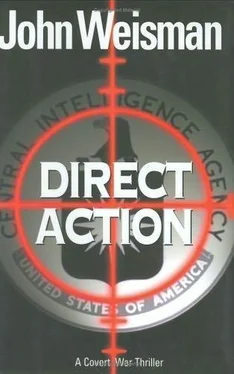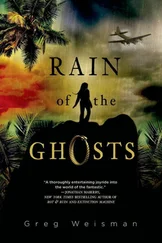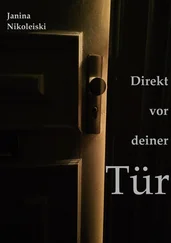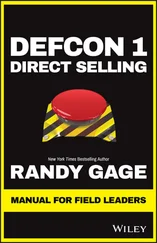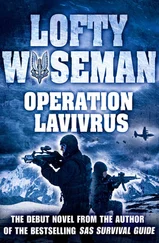While he was at Ben Gurion with MJ, Reuven had obtained copies of the pertinent debriefs. They were in Hebrew, of course, and so he’d had to translate while Tom made his own notes. It had taken the better part of two days to go through the hundreds of pages of transcripts. Then he and Reuven worked on interrogation scenarios. They’d gone for almost twenty hours straight. Reuven had finally insisted that Tom get enough rest so he’d be sharp the next day.
The next day-today. Today was what Sam Waterman used to call “showtime.”
10:31A.M. Salah stopped in front of a gray steel door with a full length sealed pin hinge. He opened the file and displayed the cover page for Tom to see. Attached to the Hebrew typing was a full-face-slash-profile mug shot of a dark-haired woman. She was plain as a sparrow. Not physically unattractive, but exceedingly ordinary. Not like Malik. Tom had seen pictures of Malik. He was an Islamic Tom Cruise.
“She’s waiting for you in there.” Salah flipped the file closed, turned to Tom, and nodded for him to enter. “Rap twice on the door,” he said in French. “I will come for you.”
“Agreed.”
Tom sneaked a quick look at the inside of his left wrist. His pulse was racing. He paused and stared at the gray door, taking a couple of seconds to clear his mind of all extraneous information, focus his concentration on the interrogation, and slow his respiration. Show nothing. Give away nothing. Display nothing.
And yet …there was so damn much to remember-so many details, factoids, info-bits. Pieces of a puzzle in a pile on a table. And you had to assemble them blindfolded. With the clock running. And lives at stake. The task was staggering. Daunting. Overwhelming.
And all in a day’s work. He put his hand on the heavy steel handle, pushed it downward, and pulled the thick door toward him.
Her name was Dianne Lamb. She was twenty-seven years old. She had been extremely easy to crack. At least that’s what the transcripts indicated. It had bothered him at first that she was a woman, because that fact indicated that the bad guys were taking things to a whole new level. In fact, not only was she a woman, but she was an educated woman-a modern, educated Western woman. This was not somebody who acted in order to secure the twenty-five-thousand-dollar onetime payment for homicide bombers from the Saudi royals (money washed through Wahabist charities), the twenty-five-thousand-dollar homicide-bomber payments Saddam Hussein skimmed off the UN’s Oil for Food Program or the blood money Arafat paid through a series of middlemen.
Dianne Lamb was a graduate of Cambridge, with a respectable second in French literature. She worked as a copy editor for the BBC’s book-publishing division, where she specialized at nitpicking typos and misprints in BBC’s profitable cook-book series. Twenty-seven years old, she lived a spinster’s life in the chic northern London neighborhood of Islington, where she shared a tiny two-bedroom flat with a forty-five-year-old bookkeeper who worked three floors below her at the Beeb. She hadn’t dated much. There’d been one serious and devastating relationship at Cambridge, and nothing since. Her family was upper middle class and professional. They lived in Surrey. Her father, Nigel, was a vice president at an international banking house who commuted to an office in the City every day. Her mother, Stephanie, who’d been born in France but brought to the UK as a three-year-old, did volunteer work at the local hospital. Neither, according to the intelligence reporting, was connected either financially or ideologically with any Islamist terrorist movement or anything that might even come close.
Nine months ago, in January, Dianne met Malik Suleiman. He was the Sorbonne-educated London-based correspondent for Al Arabia, which he’d described to her as a small Paris-based Arab-language weekly. He was tall, good-looking, and secular.
They’d met at a bar in Knightsbridge and quickly become involved. In March, he took her to Paris for a long weekend. They’d traveled on the Chunnel train, stayed at the George V, and spent their time in two-star restaurants and exclusive clubs. Malik obviously came from a wealthy family. In July and August, they returned to Paris for two more long weekends. Again, they stayed at the George V. And then, in September, Malik invited Dianne to visit the Holy Land with him. He said the magazine wanted a piece from him on how ordinary Israelis were coping with the Intifada. Once again, he would pay all the expenses. Think of it, he’d said, as an engagement trip. Once they’d returned, they’d visit his parents in Morocco and break the good news.
It was an offer she couldn’t refuse. But two days after he’d booked their flights, Malik’s publisher demanded he fly to Paris and undertake a special interview. It took some jiggling, but Malik was able to fix things. Dianne would fly directly from London. He’d take the train to Paris, do the interview, drop the tape off at the magazine, then catch the first available flight and meet her at the Tel Aviv Hilton.
But there was a problem. Because Malik was jumping from point to point, he wanted to take only carry-on luggage. Dianne had a big suitcase. Could she take a few things for him-so he’d have enough clothes for their week in Israel and the West Bank? And also his portable radio and some other personal effects?
Of course she could. And so, she flew to Israel on a Monday-the British Air flight. She took a cab from Ben Gurion and checked into the Hilton.
The room was perfect: on the eighth floor, with a broad ocean view. Malik arrived Wednesday evening from Paris, with his rolling leather carry-on and a present for her: a fabulous Louis Vuitton backpack. It was his apology for being tardy.
They made love twice. Afterward, Malik took the radio from her bag and turned it on so he could listen to BBC World News. He was, she’d told the interrogators, a real news freak-had been for as long as she’d known him.
When the radio didn’t work, he’d checked the batteries and discovered they were dead. So he’d sent her out to buy fresh ones at the newsstand in the lobby while he unpacked.
They’d traveled all over, Malik making lots of notes and taking lots of digital photographs for his article. They visited Jaffa and walked all around Tel Aviv. They took a bus all the way to Haifa and Acre. They visited Tiberias and swam in the Sea of Galilee. They stayed in a beachfront hotel in Netanya and wandered past the tourist restaurants. They spent two days in Jerusalem, staying at the American Colony Hotel, an old Arab palace on the Nablus Road. On the second day, the hotel concierge hired an Arab taxi for them and they drove through the occupied territories to visit Jericho, and then Ramallah.
In Ramallah, in a restaurant, they’d met by chance a PLO security officer who’d invited them to see evidence of how badly the Palestinians were being treated by the Israelis. He’d taken them to the Fatah offices and played a video: a long montage of photographs showing dead Palestinian children, all murdered, he said, by criminal Israeli settlers. Dianne admitted Malik had spent some time alone with the Palestinian while she looked at the video.
After one more night in Jerusalem, they took a cab to Tel Aviv and reregistered at the Hilton. They ate dinner in the room, then made love. Afterward, Malik suggested they go nightclubbing. They started at Montana, a crowded beer bar on the northern edge of Old Tel Aviv. From there, they went on to a number of clubs, working their way south, toward the Hilton. Then Malik suggested they try to get into what he called the hottest club in Tel Aviv: Michael’s Pub. It was on the waterfront, a block and a half from the American embassy.
They’d taken a cab. They were sufficiently fashionable to be allowed through the rope line after Dianne’s backpack was checked by the security guard. They’d found a table near the dance floor, ordered a couple of whiskey sours and a plate of mezze, and gotten up to dance. They’d danced two dances, and Dianne excused herself to go to the loo. That’s where she was when Malik blew himself up.
Читать дальше
